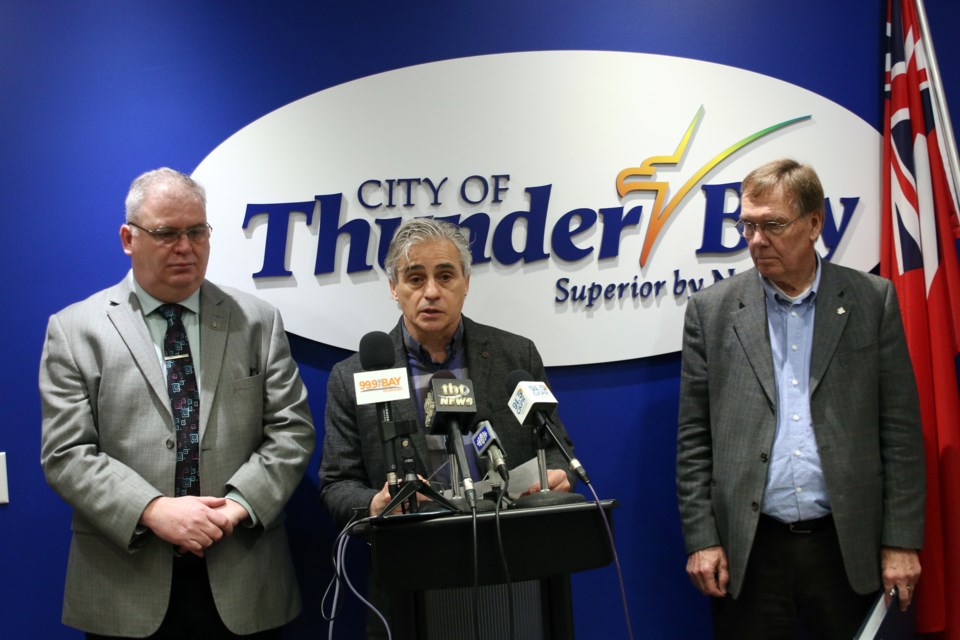THUNDER BAY - City officials continue to lobby the provincial government for much needed funds to address key issues in the city such as policing, homelessness and jobs.
A delegation from the city of Thunder Bay, which included Coun. Brian McKinnon, chair of the intergovernmental affairs committee, Mayor Bill Mauro and city manager Norm Gale, recently returned from the 2020 Rural Ontario Municipal Association Conference in Toronto.
Many of the issues brought forward last year were brought up again this year, with Mauro saying the city needs to continue to participate and ask for the same things in the hopes the province will listen to the needs of the north, but he recognizes Thunder Bay is just one among many communities competing for provincial resources.
“You just show up and you make your pitch,” Mauro said during a media conference at city hall on Wednesday. “Just because other communities are asking for it, doesn’t mean you won’t get it. Maybe everybody will get it. It depends on the particular program.”
“There are 444 cities in the province of Ontario and most of them are asking for the same things we are asking for. There is always more demand than there is resources to meet the demand ... If you can win some to help your community that is ultimately the goal."
The delegation met directly with six provincial ministers and the key priorities discussed include police services funding, Bombardier, the opioid crisis, and the collection of Provincial Offences Act fines.
Funding for police, particularly to address the growing issue of guns and gangs was discussed with Solicitor General, Sylvia Jones.
Mauro said he thanked Jones for the $2.7 million in funding the Thunder Bay Police Service received to address human trafficking, but also told her the city is incurring significant costs.
“It wasn’t the guns and gangs money we have been asking for well over a year,” Mauro said. “Federal money came through to the province of Ontario and none of that money found its way to the city of Thunder Bay, so we continue to lobby on that.”
The Police Service is also incurring costs due to the implementation of recommendations handed down by the OIPRD and the OCPC reports, which Mauro shared with Jones, not to look for help from the province, but to make her aware that there are significant costs facing policing in the city of Thunder Bay.
“The city is taking those costs internally,” he said. “It’s a significant number. I wanted her to be aware that we are not looking to the province to take this one, that we are doing our part here in the city to try and make things better and we could use a little bit more assistance from them.”
No update was provided on the status of the new jail for city, which the provincial government reaffirmed its commitment to last spring.
“(Jones') language was we are moving forward and getting closer to potentially putting an RFP out,” Mauro said. “There was not a whole lot more that could be discussed when it came to the jail. That was the update we received from her on that.”
Mauro added the delegation received positive responses from ministers when discussing issues involving the opioid crisis and Bombardier. He said there are multiple partners involved in bringing work back to the Bombardier plant.
“It’s going to require collaboration between the province of Ontario, the TTC, and perhaps the federal government,” he said.
With respect to the opioid crisis, which is impacting communities across the province, Mauro said Michael Tibollo, associate minister of health, is engaged with the issue, but there are few answers right now.
“I didn’t leave there with any definitive solutions,” Mauro said. “It’s frustrating that all you can bring forward is a reactive approach.”
The city is also hoping the province will find ways to collect billions of dollars owed in unpaid Provincial Offences Act fines.
McKinnon said they provided the government with several solutions, including accessing income tax or holding back license plates.
“Thunder Bay is owed between $30 (million) and $40 million,” he said. “If we could get some further ways to collect that money that comes into our coffers. Think about the impact that would have on our economy.”
The city is also asking the province to fund Shelter House, which the city currently does for $399,000 annually.
Gale said few if any other municipalities fund a shelter and the city would like the province to either step in fund it through the TBDSSAB.
